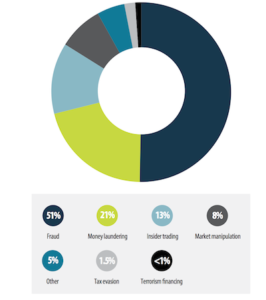AUSTRAC detects “potential vulnerability” around foreign-owned retail CFD/FX brokers with Australian licenses
A number of foreign-owned or controlled AFSL holders lack an understanding and awareness of their Australian regulatory obligations, according to a new report by AUSTRAC.

There is a scope for the improvement of CFD/FX providers’ anti-money laundering and counter-terrorism financing procedures, according to the latest report by the Australian Transaction Reports and Analysis Centre (AUSTRAC). The “Securities & derivatives sector: money laundering and terrorism financing risk assessment” report is the fourth endeavor to provide a detailed risk assessment of Australia’s financial sector. The report is published after AUSTRAC analysed two years of SMRs (suspicious matter reports) submitted by entities in the securities and derivatives sector.
Engagement with partner agencies has shown a potential vulnerability around smaller retail CFD/FX providers that are either foreign owned or foreign controlled. Moreover, a number of foreign-owned or controlled AFSL holders lack an understanding and awareness of their Australian regulatory obligations. The report notes the possibility for these entities to be exploited and used to facilitate money laundering or other illegal activities.
Moreover, 74% of CFD/FX providers registered with ASIC did not submit an SMR to AUSTRAC in the two-year period covered by the report (until March 31, 2016). AUSTRAC believes that there is considerable scope for entities operating in these markets to improve their AML/CTF systems and controls to be able to identify and submit SMRs.
White-labelling appears a trap-ridden area. The report notes the existence of various white-labelling arrangements across the sector, including variations in the roles and responsibilities of white labellers and market participants (or CFD/FX providers) regarding AML/CTF compliance activities. Poorly developed agreements and contracts that do not clearly indicate which entities are responsible for AML/CTF obligations could undermine the AML/CTF framework, AUSTRAC warns.
Some reporting entities said it was difficult to identify criminal misconduct from trading activity alone. They noted the importance of conducting appropriate levels of due diligence on customers before trading occurred.

A number of entities said that the need to execute client orders very quickly, especially in volatile markets, often stretched their capacity to properly scrutinise a customer’s trading behavior and identify potentially unusual or suspicious behavior.
A further problem is that many customers use a number of brokers and market participants to trade. As a result, detecting suspicious trading activity can be challenging as reporting entities do not have the full picture of the customer’s trading activity and open positions.
Looking at the overall picture, reporting entities named six main offence types in the 663 SMRs analysed for this risk assessment. Suspected cases of money laundering accounted for a large portion, while terrorism financing was suspected in only three SMRs. Fraud-related offences were suspected in just over half of SMRs, with a significant number enabled by cybercrime.
The activities enabled by cybercrime can be grouped into two broad trends:
- A cybercriminal hacks a customer’s email account and sends fraudulent instructions to financial institutions to close out the client’s trading positions and/or transfer client funds to other accounts or third parties.
- A cybercriminal hacks a customer’s online trading account and conducts trades, closes out positions and/or transfers funds to other accounts or third parties. In some cases this activity was enabled by fraudsters finding out the answers to the customer’s security questions by trawling through the customer’s social media.
Insider trading and market manipulation offences accounted for 21% of the SMRs submitted to AUSTRAC during the sample period. Although the bulk of these were in relation to exchange traded securities, 23 SMRs related to CFD and FX trading products.









